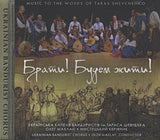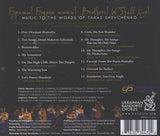Music to the words of Taras Shevchenko
Our Otaman Hamalia: Hamalia - a brave Zaporizhian kozak leader - gathers his men, sails the sea, and frees his comrades from Turkish imprisonment. As he saves them, he shouts: Brothers! We shall live!
Two Songs About Maksym Zalizniak: Born into a poor peasant family in the middle of the 18th century, Zalizniak joined the Zaporizhian kozaks and led an uprising against the Polish nobility. He was later captured and tortured by the leadership of the Russian Empire as they viewed him as a threat to their rule. Many Ukrainian songs celebrate this hero who valiantly fought for the Ukrainian people and defended the Orthodox faith.
Berestechko “Why Have You Blackened, Oh Green Field?”: The Battle of Berestechko in June of 1651 was the largest European land battle of the 17th century. The Ukrainian Zaporizhian kozaks and their allies, the Crimean Tatars, lost approximately 30,000 soldiers near this small town in western Ukraine over the course of several days in their combat against the forces of the Polish-Lithuanian Commonwealth. In Shevchenko’s poem, the field, blackened by the blood of the fallen Ukrainians, speaks to future generations of the departed: You shall not return to freedom, but shall silently till the soil while cursing your fate.
My Testament: Stetsenko, a leading Ukrainian composer of the early 20th century, masterfully captures Shevchenko’s final wishes. The poet beseeches the Ukrainian people to arise, break the shackles of tyranny, and become a free united nation. Shevchenko also hopes that we, as part of a large and free family, quietly and humbly remember him.
On The High Cliffs Above The Dnipro: The kobzars were blind minstrels that would travel throughout the cities and countryside singing epic ballads, historic songs, religious works, and humorous songs, while accompanied by a kobza-bandura. Kuchuhura-Kucherenko was one such kobzar spanning the 19th and 20th centuries. Addressing Shevchenko after his death, the song proclaims that “your kobza has not perished, all its strings ring true, and all the peoples speak of your eternal glory!”
The Warming Sun: The gentle breeze and warming sun greet the singing nightingale.
Let’s Dance Handzia!: Music by Mykhailo Verykivsky • Lyrics by Taras Shevchenko
Girls, Do Not Wonder: Two humorous vignettes from Shevchenko’s poem “Haidamaky.” The haidamak movement, consisting of free kozaks, peasantry, and rebels, waged war against the rule of the Polish nobility in the 18th century on Ukrainian territory. Shevchenko’s epic poem Haidamaky reveals the exuberant character and adventures of these men.
My Thoughts, My Songs - You Are My Only Ones: Shevchenko laments “My thoughts, my songs...do not abandon me during my hour of misfortune.”
My Thoughts, My Songs - My Misfortune: One of the most popular poems of Shevchenko set to a traditional melody. Shevchenko spent many years of his life away from his native Ukraine and was exiled by Tsar Nicholas I near the Ural Mountains under the strictest surveillance, without the right to write or paint. While meditating and contemplating, Shevchenko sends his troubled thoughts on a journey to his homeland Ukraine. There, they shall find a sincere heart, a kind word, genuine truth, and, perhaps, glory!
Excerpt from the poem “Hamalia”: Poem by Taras Shevchenko
Onward To Turkey: The kozaks sail their swift craft south into the mountainous waves of the Black Sea, heartily singing of their coming exploits, not to rob and pillage, but to slash, burn, and free their enslaved brothers from bitter Turkish captivity. An excerpt from the poem “Hamalia.”
Bandurist, You Gray Eagle: This poem, dedicated to Shevchenko’s friend Mykola Markevych, appeared in Shevchenko’s groundbreaking book of poems published in 1840 – “The Kobzar.” It likens the bandurist to a powerful gray eagle, that has the strength and the wings to fly to Ukraine and seek the freedom found in the wide-open fields of the au
DB553




